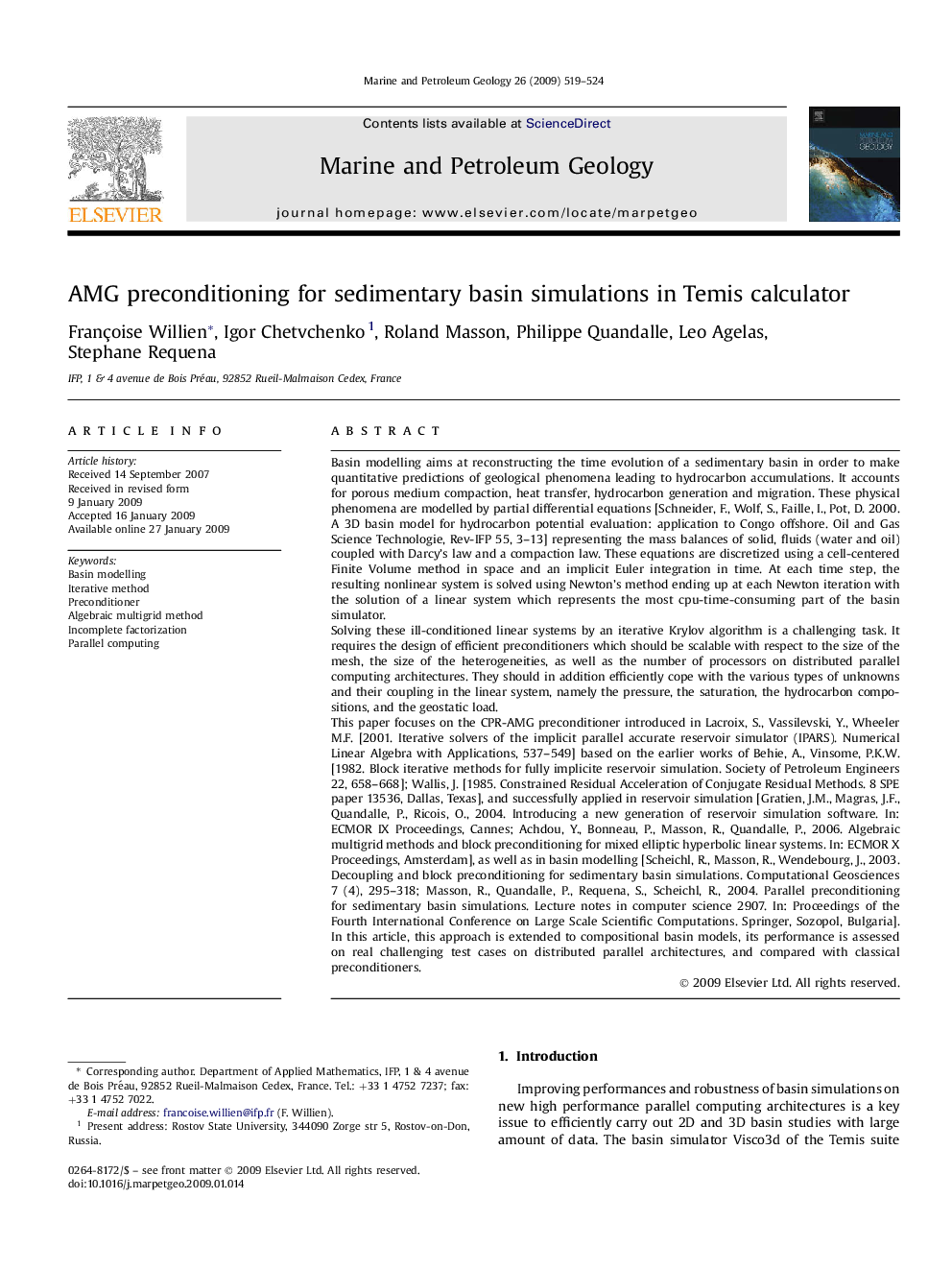| Article ID | Journal | Published Year | Pages | File Type |
|---|---|---|---|---|
| 4696657 | Marine and Petroleum Geology | 2009 | 6 Pages |
Basin modelling aims at reconstructing the time evolution of a sedimentary basin in order to make quantitative predictions of geological phenomena leading to hydrocarbon accumulations. It accounts for porous medium compaction, heat transfer, hydrocarbon generation and migration. These physical phenomena are modelled by partial differential equations [Schneider, F., Wolf, S., Faille, I., Pot, D. 2000. A 3D basin model for hydrocarbon potential evaluation: application to Congo offshore. Oil and Gas Science Technologie, Rev-IFP 55, 3–13] representing the mass balances of solid, fluids (water and oil) coupled with Darcy's law and a compaction law. These equations are discretized using a cell-centered Finite Volume method in space and an implicit Euler integration in time. At each time step, the resulting nonlinear system is solved using Newton's method ending up at each Newton iteration with the solution of a linear system which represents the most cpu-time-consuming part of the basin simulator.Solving these ill-conditioned linear systems by an iterative Krylov algorithm is a challenging task. It requires the design of efficient preconditioners which should be scalable with respect to the size of the mesh, the size of the heterogeneities, as well as the number of processors on distributed parallel computing architectures. They should in addition efficiently cope with the various types of unknowns and their coupling in the linear system, namely the pressure, the saturation, the hydrocarbon compositions, and the geostatic load.This paper focuses on the CPR-AMG preconditioner introduced in Lacroix, S., Vassilevski, Y., Wheeler M.F. [2001. Iterative solvers of the implicit parallel accurate reservoir simulator (IPARS). Numerical Linear Algebra with Applications, 537–549] based on the earlier works of Behie, A., Vinsome, P.K.W. [1982. Block iterative methods for fully implicite reservoir simulation. Society of Petroleum Engineers 22, 658–668]; Wallis, J. [1985. Constrained Residual Acceleration of Conjugate Residual Methods. 8 SPE paper 13536, Dallas, Texas], and successfully applied in reservoir simulation [Gratien, J.M., Magras, J.F., Quandalle, P., Ricois, O., 2004. Introducing a new generation of reservoir simulation software. In: ECMOR IX Proceedings, Cannes; Achdou, Y., Bonneau, P., Masson, R., Quandalle, P., 2006. Algebraic multigrid methods and block preconditioning for mixed elliptic hyperbolic linear systems. In: ECMOR X Proceedings, Amsterdam], as well as in basin modelling [Scheichl, R., Masson, R., Wendebourg, J., 2003. Decoupling and block preconditioning for sedimentary basin simulations. Computational Geosciences 7 (4), 295–318; Masson, R., Quandalle, P., Requena, S., Scheichl, R., 2004. Parallel preconditioning for sedimentary basin simulations. Lecture notes in computer science 2907. In: Proceedings of the Fourth International Conference on Large Scale Scientific Computations. Springer, Sozopol, Bulgaria]. In this article, this approach is extended to compositional basin models, its performance is assessed on real challenging test cases on distributed parallel architectures, and compared with classical preconditioners.
